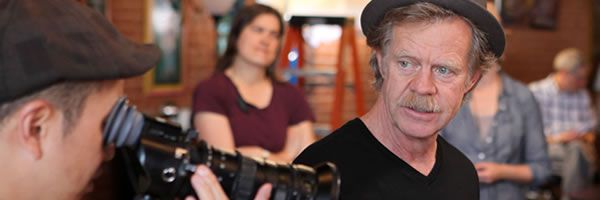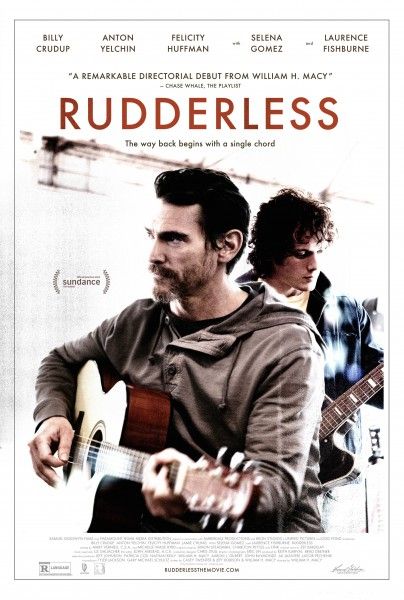Rudderless, the feature directorial debut of actor William H. Macy, follows Sam (Billy Crudup), a man whose life is torn apart by the sudden death of his son. He passes his days by drowning his pain in alcohol, until he discovers a box filled with his son’s demo tapes and lyrics, and he begins to reconnect with his son while exploring his unknown talent. When he learns and decides to play these songs in a local bar he catches the attention of a young musician named Quentin (Anton Yelchin), and the two decide to form a rock ‘n’ roll band called Rudderless.
At the film’s press day, filmmaker/actor William H. Macy spoke to Collider for this exclusive interview about looking for the right project for his directorial debut for at least 10 years now, handling the tragic act that serves as the catalyst for the film, the evolution of the film from the first script that he read, what sold him on Billy Crudup and Anton Yelchin, as musicians, and how much he had to cut out of the film for his final edit. He also talked about already knowing what his next project will be, a Southern gothic comedy, called Krystal. Check out what he had to say after the jump.
How long had you been looking for something to direct, and had you read a lot of scripts?
WILLIAM H. MACY: I’d been looking for at least 10 years. There was another script, which is my next film, I’m pleased to say, that I took to the 11th hour about three times, and it kept falling apart and breaking my heart. So finally, I said, “Okay, that one’s gotta go on the shelf for a little bit.” Then, I’d been reading scripts and a couple of them tickled me, but I’d not seen something like Rudderless before, and it had a lot of things that were important to me. It was a size film that I thought I could get made as an indie, although it does have sailboats and music. I should have had my head examined. But we got it all in, on a micro-budget.
Did you find it surprising that this movie is built around the aftermath of a violent event, in a very effective way, and yet we never actually see that violent event?
MACY: I always felt it was the only way to handle it. I love the fact that we were following the results of violence, in a way that I don’t think I’ve seen before. That’s what attracted me. And the music. It’s an old trick, but if you can mix the dark with the light, and the funny with the sad, you can go farther in both directions. I’ve always been drawn to that. It’s interesting, I’m on this TV show called Shameless, and I directed one of those [episodes], a couple of weeks ago. That was hard.
Sadly, this will probably be a topic that’s always relevant.
MACY: Losing a son is an old story. There’s the feeling of loss and not knowing someone, when a life gets snuffed out at 20 years old. I’ve got kids. They’re barely formed.
What is that next script that you said you already had lined up? What kind of story is it?
MACY: It’s a Southern gothic comedy. I loved it because it’s very literary. These people talk on. But, it’s a slamming door comedy. It’s a farce. It’s got a wrinkle, which I always seem to be attracted to. I do love comedy, but I’m not brave enough to tackle a script whose goal is to make you laugh. That’s tough. The ones that can do it, I tip my hat off to them, but I don’t have that kind of humor or mind. I do love to tell a good story that has some meat on it and has some meaning to our lives, but with as much levity as I can. I seem to go that direction, no matter what. I’ve done some pretty dark films, and I find these funny moments in them. I can’t stop myself.
MACY: It’s called Krystal. It’s about this young man who has a heart condition, and he meets an older woman who’s an ex-hooker and junkie, and it’s a spring-winter relationship. It’s funny, and it has a profundity to it. Mostly, it’s about addiction. The original title was Keep Coming Back. It’s about our fears and how we medicate them. That’s a pretty rotten description of it. My producer is going to read that and be like, “What are you trying to do to us?!” But, it’s funny.
How much did Rudderless change, from that first script that you read to the finished product we see now? Were there any major changes made, or is it pretty close?
MACY: The major shift was the identity of the shooter. That was not in the original script. We’d been working on the script for awhile, so I knew the characters well, and when one of the writers said that, my first impulse was to reject it. I got chills and had to sit down. I realized that I didn’t know how to think about it. I didn’t know where my loyalties were, and because I didn’t know, I knew that was the movie I had to make. It was the scariest movie to make. That’s when I thought, “Okay, we’ve got a movie,” and that’s when things started to heat up. It took us awhile. We had to rewrite everything because of it. And then, the interesting question was where to put it. I kept moving it farther and farther into the body of the film. And there’s a put where you’d lose the audience because they’d feel manipulated. This is a tough story. I didn’t give myself any favors. Not only are there sailboats and music, but we’re telling this story in an odd fashion and revealing things in a somewhat unorthodox way. The danger with that is that the audience would say, “You were just manipulating me.” From the very beginning, everything existed. It was all truthful. Having seen the film once, if you look at it again, you’ll say, “Okay, I wasn’t manipulated. It was all there.” It’s not the smartest thing to wait an hour into the film to reveal a big twist.
To add to everything, you hired to lead actors who aren’t really musicians to play your musicians. What sold you on Billy Crudup and Anton Yelchin?
MACY: The two fellows who wrote the music, Simon [Steadman] and Charlton [Pettus], reassured me that I could cast the film without worrying about the music. Billy plays guitar. He got a lot better on this film. He really worked hard on it. Anton has played guitar. So, they really had the guitar skills needed to fake it. And Ben Kweller is in the film. He’s a rootin’ tootin’ rock n’ roller, and has been since he was 10 years old. Ryan Dean, the drummer, is also a real musician. So, half the band was the real deal and the other half were actors trying to fake it. I had this cherished delusion that I would get four crackerjack musicians and we would tour the country for six months, and then we’d shoot the film and record everything like. It was Charlton Pettus who said, “If you had cast the Rolling Stones, I would tell you not to do it that way. You can’t do it.” It’s all to playback, anyway. I watched all the films with music and I learned from them. The music had to be great because it represents Josh, the dead kid. It’s his voice, and that’s a big player in the film, so they had to be good tunes. We finished the film at Skywalker Sound, and those guys are just genius, so it really looks like they’re playing it live. They rolled sound, on the day, even though it was to playback, so that you could hear the click of the pic on the string and of the drums. They mixed some ambient sound from the day with the playback, and it sounds like they’re playing it. Big musicians have said, “You got that part right.” The alternative is the Glee thing, where it’s just clearly studio.
How long was your first cut of the film, and do you have a lot of deleted scenes?
MACY: There were more than I anticipated. I was flattering myself that there’d be a foot of film left over. I thought I’d cut the script to the bone, but I ended up cutting a lot. I bet I cut 10% of what I shot, maybe 15%. It’s not that much, but I thought it was as lean as could be. Sometimes you have to see it all screened together to figure out where your story is. When it’s on the page, you think the audience needs that information, but when you see it screened, you realize you don’t need it. There’s a part of me that says, “Oh, I wasted so much effort and capital on those scenes that I didn’t use,” but no harm, no foul. Everybody goes through that.
Rudderless is now in theaters and on VOD.


